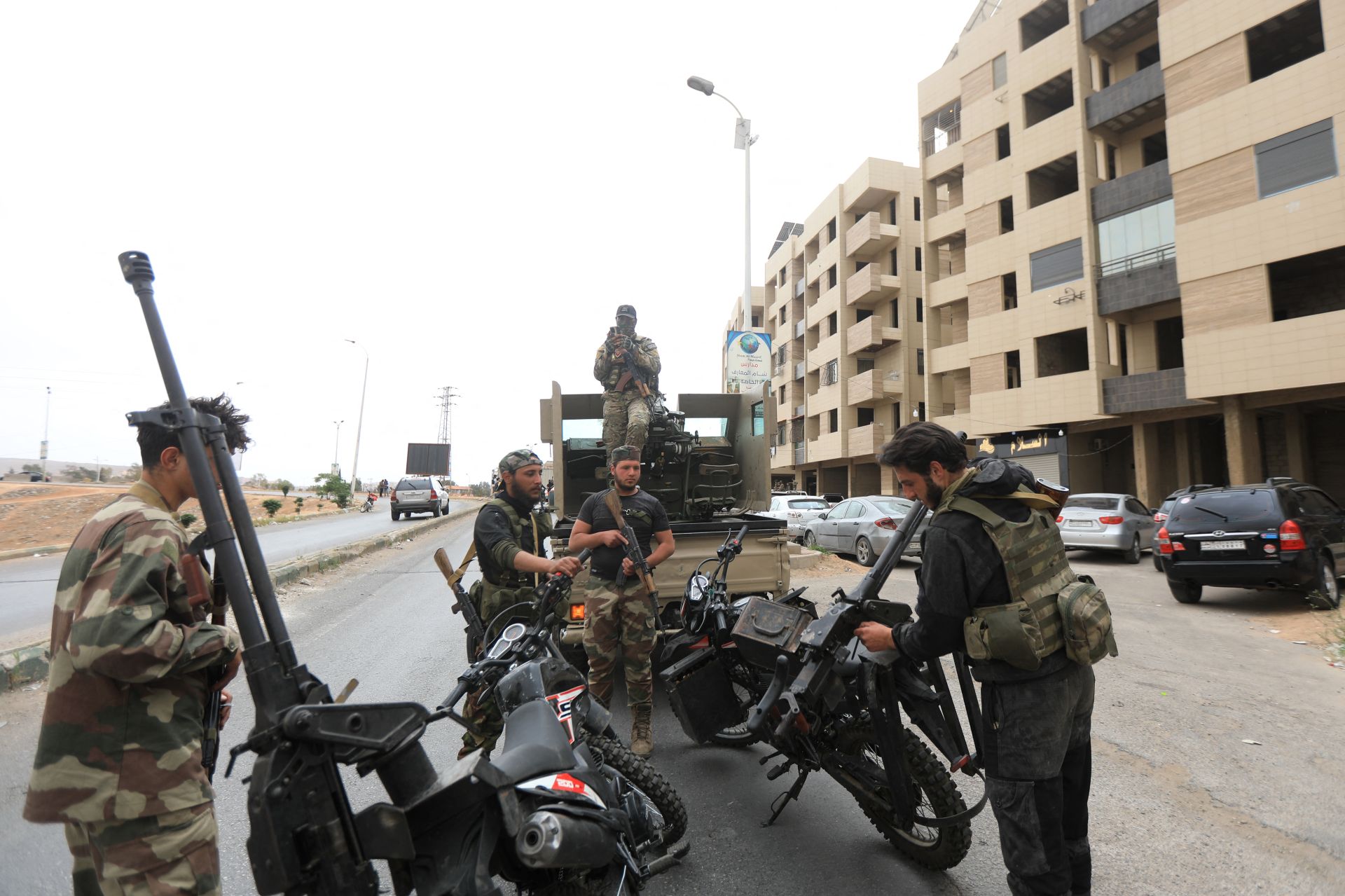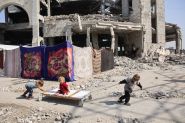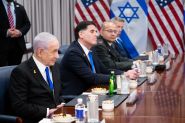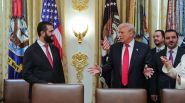- Home
- Middle East
- Syria Slams “Dangerous Escalation” After Israeli Strike in Damascus

Members of Syria's security forces deploy in an area near the Syrian capital Damascus on April 30, 2025 ©(Bakr ALKASEM / AFP)
Syria's Islamist rulers on Friday denounced an air strike near the presidential palace as a "dangerous escalation", as Israel called it a "clear message" not to harm the Druze minority.
The dawn strike came hours after senior Druze clerics and armed factions reaffirmed their loyalty to Damascus and rejected any call for secession.
They also urged the authorities to appoint local officials to government posts in the Druze heartland in Sweida province.
Their statement followed sectarian clashes between Druze fighters and Syrian forces, including government-affiliated groups.
The clashes killed more than 100 people in Jaramana and Sahnaya near Damascus and in Sweida, war monitor the Syrian Observatory for Human Rights said.
Also Friday, an apparent drone strike killed four Druze fighters at a farm in Sweida, the Observatory said.
It was unclear who was behind the strike, but Syria's official SANA news agency insisted it was an Israeli attack.
Friday's early morning blast in the presidential palace area of Damascus was heard across the city, an AFP correspondent reported.
Israeli military spokesman Avichay Adraee said "warplanes attacked... the area near Ahmed Hussein al-Sharaa's palace in Damascus", referring to the interim president.
In a joint statement, Israeli Prime Minister Benjamin Netanyahu and Defence Minister Israel Katz called it a "clear message" to Syria's new rulers.
"We will not allow forces to be sent south of Damascus or any threat to the Druze community," they said.
Syria's presidency called the strike "a dangerous escalation against state institutions", and accused Israel of destabilising the country.
UN Secretary-General Antonio Guterres condemned the Israeli strike as a violation of Syria's sovereignty, his spokesman said.
The UN-mandated Independent Commission of Inquiry on Syria expressed concern at the "deadly clashes with sectarian dimensions", and said Israeli air strikes increased the risk to civilians.
After this week's clashes a deal to de-escalate was agreed between Druze representatives and the government, prompting troop deployments in Sahnaya and tighter security around Jaramana.
Syrian officials said the agreement also included the immediate surrender of heavy weapons.
An AFP photographer saw troops taking over checkpoints from Druze gunmen in Jaramana, although no handover of weapons was witnessed.
'Outlaw groups'
Qatar, a main backer of Syria's new rulers, and Saudi Arabia condemned Israel's "aggression", and a German foreign ministry statement said "Syria must not become the venue for regional tensions to be played out".
Israel has attacked hundreds of military sites since Islamist-led forces deposed longtime president Bashar al-Assad in December.
It has also sent troops into the demilitarised buffer zone that used to separate Israeli and Syrian forces on the Golan Heights.
On Wednesday, Israel launched strikes near Damascus and threatened more if violence against the Druze continued.
The unrest inside Syria was sparked by the circulation of an audio recording attributed to a Druze citizen and deemed blasphemous. AFP was unable to confirm its authenticity.
Syria's government said "outlaw groups" were behind the violence, but the Observatory and Druze residents said forces affiliated with the new authorities attacked Jaramana and Sahnaya and clashed with Druze gunmen.
"The situation is calm, but we are scared. Everyone is terrified," 35-year-old housewife Arij told AFP, adding that many Christians and Druze "have fled to Damascus".
'Genocidal campaign'
Mohamad Halawa, a security official in Damascus province, said there was now a security cordon around Jaramana where residents would be "under the umbrella of the state and the judiciary".
In Sweida, religious authorities and military factions said after a meeting that they are "an inseparable part of the united Syrian homeland", and rejected "division, separation or secession".
SANA said security forces were being sent to Sweida to "maintain security".
The move came after Sheikh Hikmat al-Hijri, a Druze spiritual leader, on Thursday condemned what he called a "genocidal campaign" against his people.
Syria's new Islamist authorities have roots in the Al-Qaeda jihadist network. They have vowed inclusive rule in the multi-confessional, multi-ethnic country, but must also contend with internal pressures from radical Islamists.
On Friday, Sharaa met Lebanese Druze leader Walid Jumblatt, who on Wednesday urged the minority community in Syria to reject "Israeli interference".
The latest violence follows massacres of Alawites in March, when the Observatory said the security forces and their allies killed more than 1,700 civilians.
It was the worst bloodshed since the overthrow of Assad, who is from the minority community.
The government accused Assad loyalists of sparking the violence, and launched an inquiry.
AFP
Read more



Comments